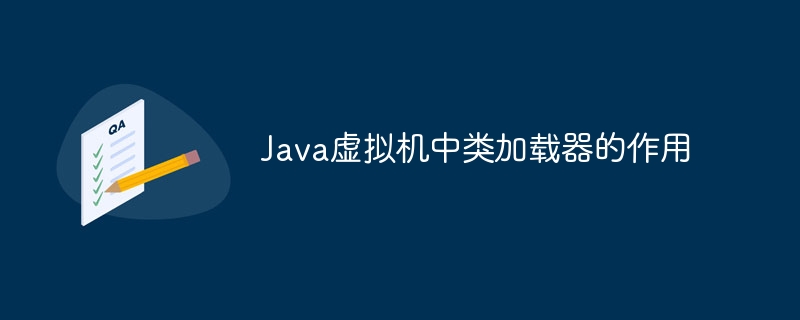Home >Java >javaTutorial >The role of class loader in Java virtual machine
The role of class loader in Java virtual machine
- WBOYWBOYWBOYWBOYWBOYWBOYWBOYWBOYWBOYWBOYWBOYWBOYWBOriginal
- 2024-04-13 14:51:01808browse
The role of the class loader: Loading: Read class files from the specified source. Verification: Confirm that the class file conforms to the specification. Preparation: allocate memory and initialize static variables. Parse: Parse symbol references. Initialization: Call the

The role of class loader in Java virtual machine
Introduction
Java The virtual machine's (JVM) class loader is responsible for loading and validating the class files required by a Java application. Class loaders play a vital role in the execution of Java programs by ensuring that the correct class files are loaded, verifying their integrity and security, and creating classes that can be understood and executed by the JVM.
The role of the class loader
- Loading:The class loader loads from ClassPath or other specified sources (such as the network or database) class file. It first locates the binary representation of the class file and then loads it into JVM memory.
- Verification: After loading, the class loader verifies whether the class file complies with the Java language specification. It checks that the bytecode instructions are valid, the class structure is complete, and there are no conflicts or invalid bytecode.
- Preparation: After verification, the class loader prepares the class file as a runtime data structure. It allocates memory for class instances and initializes static variables of the class.
- Parsing: The class loader parses the symbol reference in the class file and resolves it to the actual address of the referenced class. It builds the symbol table so that the JVM can locate the class and its members.
-
Initialization: Finally, the class loader initializes the class. It calls the class's
() method, executes the class static initialization block, and allocates the class object. Now, the class can be instantiated and used by the application.
Practical Case
Let us consider a practical case using a custom class loader. Suppose we have a custom class loader named MyClassLoader which reads class files from the database:
import java.io.ByteArrayInputStream;
import java.io.InputStream;
public class MyClassLoader extends ClassLoader {
@Override
protected Class<?> findClass(String name) throws ClassNotFoundException {
// 从数据库读取类文件
byte[] bytes = getBytesFromDB(name);
// 将字节数组转换为输入流
InputStream is = new ByteArrayInputStream(bytes);
// 使用自定义类加载器定义类
return defineClass(name, is, null);
}
private byte[] getBytesFromDB(String name) {
// 在此方法中实现从数据库获取类文件的逻辑
}
}Using this custom class loader, we can dynamically load classes while They don't have to be loaded from the file system. This is useful for deploying database-based applications or managing dynamically updated code bases.
Conclusion
The class loader plays a key role in the Java Virtual Machine, ensuring that classes are loaded and verified correctly, and creating classes that can be executed by the JVM. By using a custom class loader, we can achieve dynamic loading of classes, which provides greater flexibility to Java applications.
The above is the detailed content of The role of class loader in Java virtual machine. For more information, please follow other related articles on the PHP Chinese website!

